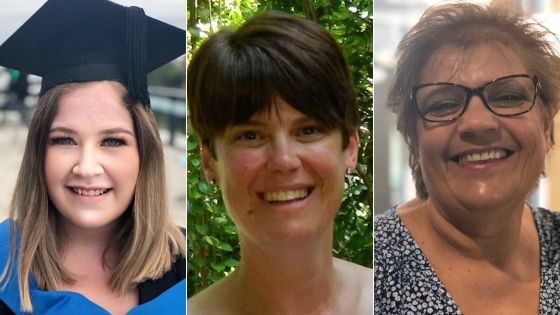Highly Competent Graduates are headed for the Early Years Workforce
Date 13.08.2019

Those working in the early years Sector have long been working to strengthen the professional practice of the workforce. In 2018, the University of Northampton, in partnership with the Early Childhood Studies Degree Network (ECSDN), rolled out new Graduate Practitioner Competencies, which aim to enhance the identity of the early years workforce and strengthen the professional practice aspect of early years degree programmes across the UK.
The development of Early Childhood Graduate Practitioner Competencies was led by Dr Eunice Lumsden, Head of Early Years at the University of Northampton. Just a year later, the first students studying the competencies within their Early Childhood Studies degree programmes at the University of Northampton have graduated, and are entering the early years workforce.
Dr Eunice Lumsden, Head of Early Years at the University of Northampton, and author of the new competencies, said: “The introduction of the Early Childhood Graduate Practitioner Competencies was an important development in further professionalising and recognising those working in the sector.
“I’m so proud that the first cohort of students to have studied these competencies have now graduated. I strongly believe that having completed the competencies, graduates will stand out when applying for jobs, benefitting children’s development. Graduates who have studied the competencies have a fantastic breadth and depth of theoretical knowledge about the key factors in early years education and are able to put their understanding into practice at a highly-skilled, graduate level.
“With these Competencies, we are making an important contribution towards building a graduate-led workforce better able to advocate for, and support, young children and their families.”
University of Northampton graduate, Bethany Hunt, said: “These Competencies have enhanced the way I reflect on my professional practice, and through this reflection, it’s helped me to realise the abilities that I have. Working through the competencies, I’ve found confidence in the way I can apply my theoretical knowledge to my practical work to best advocate for young children.
“The safeguarding competency has been especially useful, and has encouraged me to delve deeper into safeguarding issues. You can’t look at a child, without looking at the context of the family, these competencies are rooted in that thinking and have helped me to develop this crucial understanding. I’ve already applied that in a safeguarding case I was dealing with in a setting, which had a massive impact on the family I was working with.”
There are different routes into the early childhood careers, with some programmes having an academic focus only, while others offer placement opportunities or are employment based. These nine competencies are assessed through placement tasks, observations of practice and academic assignments, ultimately benefitting the child.
Tanya Richardson, Senior Lecturer in Early Years at the University of Northampton, said: “Embedding the Graduate Practitioner Competencies within the Early Childhood Studies degree has made me really consider how, and what, we teach on this programme. The course content has always been relevant and students have found it to be in depth and applicable to daily practice but the addition of the competencies have enhanced it even further. As a teaching team we have reviewed the content of this course and continue to develop and enhance the practical skills that students need when working with young children and their families. This has resulted in our students having a wider range of skills to enter the workplace with and will ultimately have a positive impact on those with whom they work.”
The Early Childhood Graduate Competencies are:
- Advocating for young children’s rights and participation
- Promoting holistic child development
- Working directly with young children, families and colleagues to promote health, well-being, safety and nurturing care
- Observing, listening and planning for young children to support their well-being, early learning, progression and transitions
- Safeguarding and child protection
- Inclusive practice
- Partnership with parents and caregivers
- Collaborating with others
- Professional Development.
Find out more information on the Early Years programmes available at the University of Northampton.